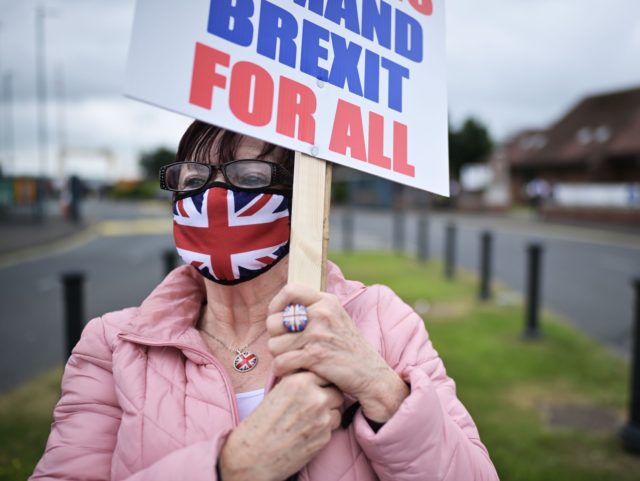British negotiators have dropped a red line Brexit demand, allowing the European Court of Justice (ECJ) to have the final say on some matters in Northern Ireland.
British negotiators have dropped the demand that the European Court of Justice (ECJ) must not have the final say regarding EU laws in Northern Ireland, despite the fact it is supposed to be free of the bloc along with the rest of the United Kingdom.
The demand had once been a red line issue for Johnson administration, as diplomats aimed to wrestle an agreement from the EU regarding a replacement for the Northern Ireland Protocol of the Brexit deal.
According to a report by The Telegraph, the demand to end the role of the ECJ in Ulster has been put on hold for the foreseeable future.
As a result, Boris Johnson will allow the foreign court to have the binding final say regarding the application of EU law in the province.
This shift comes despite government sources previously saying that rumours regarding the issue being dropped were “b—–s”.
The Telegraph went on to report that Britain’s chief negotiator, Lord David Frost, would instead ask Brussels to agree to a staged approach to reducing the role of EU judges in the UK.
Frost has also said that “a solution is needed on governance” regarding the position of the ECJ in Northern Ireland.
“This remains a fundamental issue of democratic accountability,” Frost said in a statement released on Friday. “Nor is it reasonable or fair for disputes between the UK and the EU relating to the Protocol to be settled in the EU Court of Justice, the court of one of the parties.”
“The Withdrawal Agreement already provides for the use of an independent arbitration mechanism instead, and the simplest and most durable way forward would be to agree that this should be the sole route for settling disputes in future,” the statement continued.
Frost had also proposed that a so-called “interim agreement” be implemented in order to “deal with the most acute problems, including trade frictions, subsidy control, and governance”.
“Our preference would be to reach a comprehensive solution dealing with all the issues,” Frost wrote, going on to say that such an interim agreement would “still leave many underlying strains unresolved”, and would be “provisional by nature”.
“The UK has proposed a number of possible ways forward, but regrettably it has not so far been possible to make progress even on what the core elements of an interim agreement might be,” Frost said. “A solution needs to be found urgently early next year.”
For as long as there is no agreed solution, we remain ready to use the Article 16 safeguard mechanism if that is the only way to protect the prosperity and stability of Northern Ireland and its people,” Frost also warned.
On Saturday Frost resigned from the government, leaving it unclear how negotiations with the EU will proceed when they resume in January.
While the United Kingdom left the European Union in January of last year, the issue of Northern Ireland has remained contentious well past that date.
The post-Brexit situation in the region was meant to be resolved back in 2019, with the signing of the Northern Ireland Protocol, but issues surrounding the agreement have since cropped up.
According to Frost, the agreement has since become “the biggest source of mistrust” between the United Kingdom and the European Union.
The protocol has repeatedly come under fire from pro-British Unionists in Northern Ireland, who have criticised its implementation of border checks between Northern Ireland and the rest of the United Kingdom.
Leader of the Democratic Unionist Party (DUP) Jeffrey Donaldson has claimed that the protocol “fundamentally undermines … the economic integrity of the United Kingdom and Northern Ireland’s position in it”.
“We are totally opposed to the protocol as it presently exists,” Donaldson said in September this year. “We will neither accept it nor will we work it.”
Unionists have also alleged that their interests were not given the same weight as those of Irish nationalists during Brexit negotiations.
“I don’t think that there’s been just and equal treatment of both communities. I think that the ethos and aspirations and interests of the nationalist community were carefully safeguarded by the EU,” one Unionist councillor told the United Kingdom’s Northern Ireland Affairs Committee.
“The identity and ethos of the Unionist community, as equal citizens with everyone else in the United Kingdom, was sacrificed.”

COMMENTS
Please let us know if you're having issues with commenting.